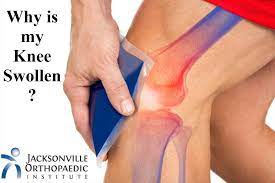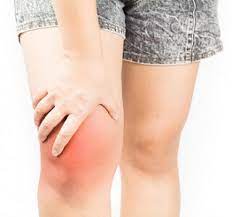

Swelling Knee
Knee swelling is a common problem that can occur due to various reasons. It can be caused by an injury, inflammation, or an underlying medical condition. Swelling in the knee can lead to discomfort, pain, and difficulty in movement. In this article, we will discuss knee swelling in detail, including its causes, diagnosis, and treatment options.


Understanding Knee Swelling:
Knee swelling is a condition in which the knee joint becomes enlarged due to the accumulation of fluid in or around the joint. It can be caused by a variety of factors, such as injury, arthritis, or infection. The swelling can range from mild to severe, and it can affect one or both knees. Knee swelling can also lead to other symptoms, such as stiffness, pain, and difficulty in bending or straightening the knee.


Key Takeaways:
Knee swelling is a common symptom that can be caused by a variety of factors. Swelling in the knee joint can be due to an accumulation of fluid, inflammation, or injury, among other things.
When the knee joint is swollen, it may appear red and warm to the touch. The skin around the joint may also be stretched and appear shiny. This type of swelling is called an effusion.
Effusions can be caused by a variety of factors, including injury, overuse, or underlying medical conditions such as arthritis. In some cases, fluid may accumulate in the joint due to an infection or other underlying medical condition.
If you experience knee swelling, it is important to seek medical attention to determine the underlying cause. Treatment will depend on the cause of the swelling and may include rest, ice, compression, and elevation of the affected leg. In some cases, medication or physical therapy may also be recommended.
It is important to avoid putting too much weight on a swollen knee, as this can exacerbate the swelling and delay healing. If you experience redness or warmth in addition to swelling, it may be a sign of an infection and you should seek medical attention immediately.
In conclusion, knee swelling can be a symptom of a variety of underlying medical conditions. If you experience knee swelling, it is important to seek medical attention to determine the underlying cause and receive appropriate treatment.
Knee swelling can be caused by a variety of factors, including injury, medical conditions, age, and lifestyle. Understanding the causes and risk factors of knee swelling can help individuals take preventative measures to avoid future swelling.
Injury and overuse are common causes of knee swelling. Sports and trauma, such as a torn ligament or anterior cruciate ligament (ACL), can cause swelling. Falls, kneeling for extended periods, and overuse from repetitive motions can also lead to knee swelling.
Medical conditions such as arthritis, rheumatoid arthritis, gout, and osteoarthritis can cause knee swelling. Bursitis and pseudogout are also common causes of knee swelling. Autoimmune diseases can lead to knee swelling as well.
Age and lifestyle can also contribute to knee swelling. Maintaining a healthy weight can help prevent knee swelling, as excess weight puts additional strain on the knee joint. Stress and fever can also contribute to knee swelling.
Other factors that can cause knee swelling include infections and pus. It is important to seek medical attention if knee swelling is accompanied by fever or other symptoms.
Overall, understanding the causes and risk factors of knee swelling can help individuals take preventative measures to avoid future swelling.
If you are experiencing knee swelling, your doctor will begin with a thorough medical examination. They will ask about your symptoms and medical history, and may perform a physical examination of your knee. They may also order imaging tests, such as a CT or MRI, to get a better look at your knee joint.
In some cases, your doctor may also perform arthrocentesis, which involves removing a sample of fluid from your knee joint for analysis. This can help to determine the cause of your knee swelling.
Treatment for knee swelling will depend on the underlying cause. In many cases, rest, ice, and pain relievers such as acetaminophen or nonsteroidal anti-inflammatory drugs (NSAIDs) may be recommended.
If your knee swelling is due to inflammation, your doctor may prescribe corticosteroids to help reduce swelling and inflammation. Physical therapy may also be recommended to help strengthen the muscles around your knee and improve range of motion.
In some cases, surgery may be necessary to treat knee swelling. This may include arthroscopy, which involves using a small camera to view the inside of your knee joint and make repairs, or knee replacement surgery if the joint is severely damaged.
It is important to work closely with your doctor to determine the best course of treatment for your knee swelling. With proper diagnosis and treatment, many people are able to find relief from their symptoms and improve their quality of life.
When it comes to knee swelling, prevention and self-care are crucial. Here are some tips to help manage your knee swelling and prevent it from getting worse.
Maintaining a healthy weight is important for reducing the stress on your knees. Exercising regularly can also help strengthen the muscles around your knees, which can help reduce knee swelling. Low-impact exercises such as swimming, cycling, and yoga are great options for those with knee problems.
Rest is important for allowing your knee to heal and reducing inflammation. Avoid putting too much pressure on your knees, and try to keep them in a neutral position when sitting or lying down. When standing, distribute your weight evenly between both legs.
Over-the-counter pain relievers such as ibuprofen can help reduce pain and inflammation. Applying heat or cold to your knee can also help reduce swelling. Elevating your knee above heart level and wearing an elastic bandage or brace can also help reduce swelling.
Remember, prevention and self-care are key to managing knee swelling. By following these tips, you can help reduce pain and inflammation and prevent further damage to your knees.
There are many causes of knee swelling, including injury, overuse, arthritis, infections, and other medical conditions. It is important to see a doctor if you experience knee swelling to determine the underlying cause.
The fastest way to get rid of fluid on the knee is to rest, elevate the leg, apply ice, and use compression. Over-the-counter pain relievers can also help. If the swelling does not improve, it is important to see a doctor.
To reduce swelling in your knee, you should rest, elevate the leg, apply ice, and use compression. Over-the-counter pain relievers can also help. If the swelling does not improve, it is important to see a doctor.
A knee can swell without injury due to medical conditions such as arthritis, infections, and gout. It is important to see a doctor if you experience knee swelling to determine the underlying cause.
If your knee has been swollen for 3 weeks, it is important to see a doctor. The swelling could be due to a medical condition that requires treatment.
A swollen knee in an older person could be due to arthritis, infections, or other medical conditions. It is important to see a doctor to determine the underlying cause and receive appropriate treatment.
As a physical therapist with over 30 years of experience, I've helped countless patients identify…
Rheumatoid arthritis (RA) is a chronic autoimmune disease that follows a progressive course, typically worsening…
Discover how to alleviate Knee pain when vacuuming on carpet with our expert tips and…
Discover the best foam padding for carpet knee pain. We review top products to help…
We're analyzing Carpet vs. hard floor knee pressure to help you decide which flooring is…
Discover how Knee bursitis and carpet surfaces are connected in our Ultimate Guide. Learn the…